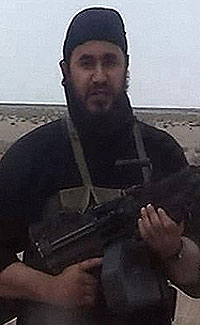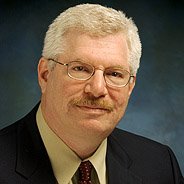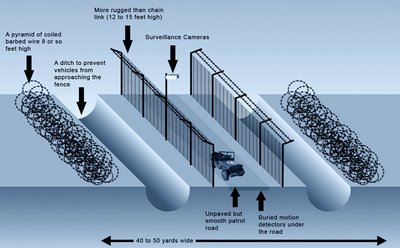 Abu Musab al-Zarqawi, al-Qaida’s leader in Iraq, is shown here in a video originally posted on Tuesday. He accused the West and the United States of waging a “crusader” war against Islam but said Muslim holy warriors were standing firm. The image was provided via the IntelCenter, a private contractor working for intelligence agencies. — AP Photo / via IntelCenter
Abu Musab al-Zarqawi, al-Qaida’s leader in Iraq, is shown here in a video originally posted on Tuesday. He accused the West and the United States of waging a “crusader” war against Islam but said Muslim holy warriors were standing firm. The image was provided via the IntelCenter, a private contractor working for intelligence agencies. — AP Photo / via IntelCenterIf one reads only the newspapers or follows events via television news, it becomes impossible to get information about how the war on terror is proceeding along.
The new government in Iraq is beginning to take hold and the pressure on al-Qaida is being turned up by our special forces. A special forces update highlights the events of its activities over the last couple of weeks (ht: Michelle Malkin).
Excerpts from the Marine Corps Times -
SpecOps unit nearly nabs Zarqawi
By Sean D. Naylor - Times staff writer - April 28, 2006
Just nine days before al-Qaida in Iraq leader Abu Musab al-Zarqawi released his latest video, a special operations raid killed five of his men, captured five others and apparently came within a couple of city blocks of nabbing Zarqawi himself.
Then, the day Zarqawi’s video debuted, special ops forces killed 12 more of his troops in a second raid in the same town.
The raids in Yusufiyah, 20 miles southwest of Baghdad in the heart of the Sunni Triangle, were the latest battles in a small, vicious war being waged largely in the shadows of the wider counterinsurgency effort.
It is a war fought by a secretive organization called Task Force 145, made up of some of the most elite U.S. troops, including Delta Force and SEAL Team 6. They have one goal: hunting down Zarqawi, Iraq’s most wanted man, and destroying his al-Qaida in Iraq organization.
Zarqawi’s escape in Yusufiyah was not the first time special ops troops have nearly had him. In early 2005, they came so close they could see the Jordanian’s panicked face as he fled.
--
Among items recovered from the safe house, the special operations source said, was a video showing Zarqawi at various times in “black pajamas with New Balance running shoes on.”
The source said the video seized in Yusufiyah was the same one released April 25.
One section of the video shows Zarqawi firing an M249 squad automatic weapon outside, and another depicts him sitting inside next to an M4 assault rifle.
In the video, Zarqawi mocks President Bush, and makes clear his fierce opposition to attempts to establish democracy in Iraq.
Produced by al-Qaida in Iraq’s “Media Committee,” the video reflects “Zarqawi’s number one thing … the information campaign,” said the special ops source.
But on the same day that video was released, “coalition forces” killed 12 other fighters at another Yusufiyah safe house “associated with foreign terrorists,” according to Central Command.
The special operations source confirmed that this was another TF 145 raid. The news release said “multiple intelligence sources” led troops to the safe house. As they approached, a man ran out brandishing what Central Command described as “a shoulder-fired rocket,” which he was attempting to launch when the operators shot and killed him.
--
A war within the war
The job of hunting Zarqawi and rolling up his al-Qaida in Iraq network falls to Task Force 145, which is made up of the most elite U.S. and British special operations forces, and whose headquarters is in Balad.
The U.S. forces are drawn from units under Joint Special Operations Command at Pope Air Force Base, N.C. These include the military’s two “direct action” special mission units — the Army’s 1st Special Forces Operational Detachment-Delta, known as Delta Force, and the Navy’s SEAL Team 6, sometimes known by its cover name, Naval Special Warfare Development Group; the Army’s 160th Special Operations Aviation Regiment and 75th Ranger Regiment; and the Air Force’s 24th Special Tactics Squadron.
After Saddam Hussein’s fall, the first order of business for the JSOC forces was capturing or killing the 55 individuals on the “deck of cards” that depicted the regime’s senior officials. Delta’s C Squadron was at the heart of the task force that captured Saddam in December 2003.
The emergence of Zarqawi and his al-Qaida in Iraq group as a major threat to Iraq’s stability then gave JSOC a new priority. As the war in Iraq has ground on, and with Zarqawi still on the loose, the JSOC force in Iraq has grown steadily and undergone several name changes. TF 121 and TF 626 were two previous incarnations.
--
Bigger than Osama
TF 145’s war with Zarqawi has become a higher priority for JSOC than capturing al-Qaida leader Osama bin Laden and his right-hand man, Ayman al-Zawahiri, presumed to be hiding somewhere in Pakistan’s North-West Frontier Province along the border with Afghanistan.
“Iraq is the main effort” for JSOC, the special operations source said, adding that JSOC’s presence in Afghanistan is much smaller than it is in Iraq — a reflection of the threat Zarqawi poses to U.S. efforts in Iraq.
“Who’s the biggest threat right now?” the source said. “In military terms, bin Laden has been neutralized. He’s not going anywhere. He can’t really move. His communications are shallow. … Zarqawi is a bigger threat.”
--
So close, and yet …
The burgeoning size of the JSOC commitment to Iraq speaks to the challenge posed by Zarqawi, who elicits grudging respect from special operations personnel for the risks he takes leading from the front.
“You’ve got to respect your enemy,” said a special operations source. “He’s an out-front commander. He’s using all the elements to fight us.”
But Zarqawi’s command style and his determination to take the same risks as his fighters have almost led to his capture on several occasions, with perhaps his closest brush with JSOC coming Feb. 20, 2005.
Using intelligence derived in part by an Arab-American soldier in TF 145, the task force obtained a time frame for when Zarqawi was due to travel down a stretch of highway along the Tigris River.
This allowed a task force of Rangers and Delta operators to set up an elaborate ambush. But according to special operations sources familiar with the event, Zarqawi was late.
The U.S. troops were preparing to leave when his vehicle came into view. He and his driver blew through a Delta roadblock before nearing a Ranger checkpoint. The Ranger M240B machine-gunner had Zarqawi in his sights and requested permission to fire, but the lieutenant in charge of the checkpoint did not give the OK because he did not have “positive ID” of the vehicle’s occupants, a TF 145 source said.
--
Beyond Zarqawi, bin Laden and Zawahiri, there are other targets that JSOC could hit, if it had the authority and resources, the special ops source said.
The U.S. knows of “high-tier” al-Qaida personnel in multiple European countries, he said. They’re around the world ... The point is, does the U.S. have the resolve … to go conduct a unilateral operation to get these folks?”
Asked if anyone in JSOC was doing this now, he said, “Not really.”
Part of the reason: Special mission units are already stretched by the mission in Iraq.
“There’s no one left,” he said.
Read All>>
Dateline, 20/20, 60 minutes, and etc. all could be doing special reports on our effort from the "front". The New York Times, The Washington Post, The Los Angeles Times, and etc. all could be writing special front page stories about our effort on the "front". Neither journalistic outlet does ... WHY?
Thanks to the military for getting the job of reporting done as well ... The total job and nothing less.











